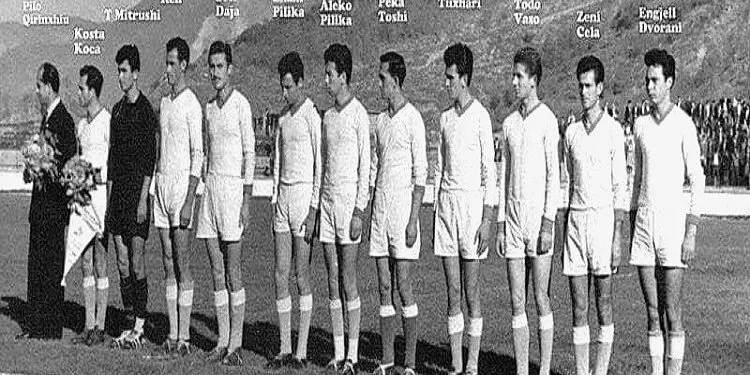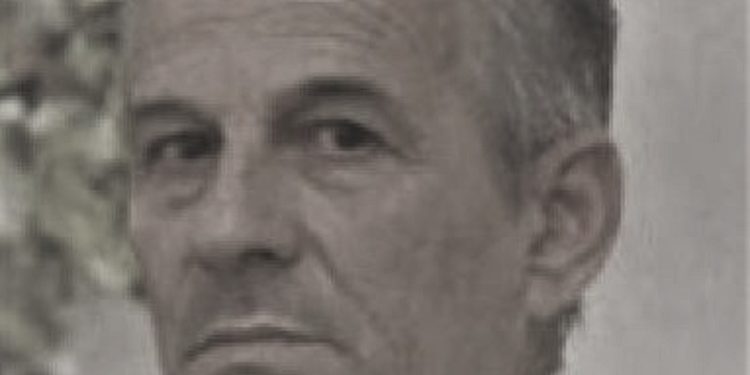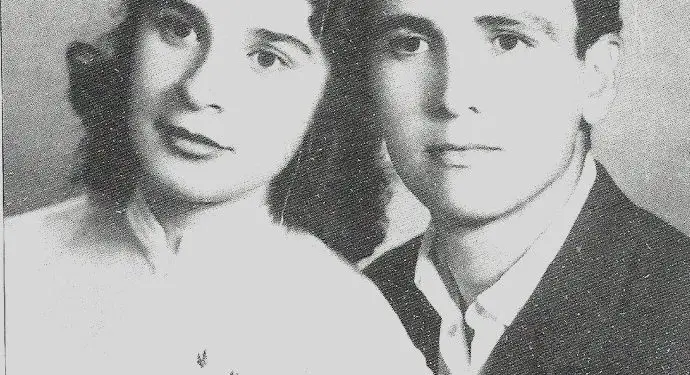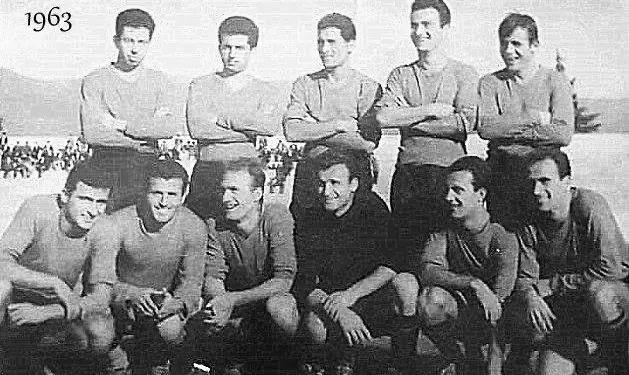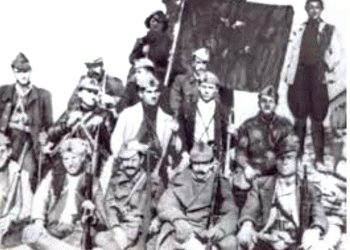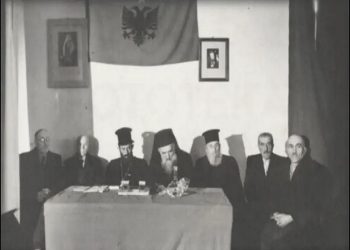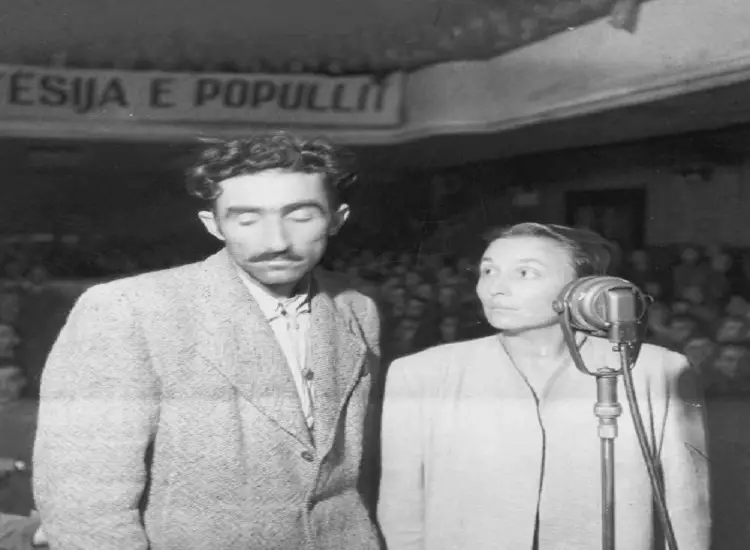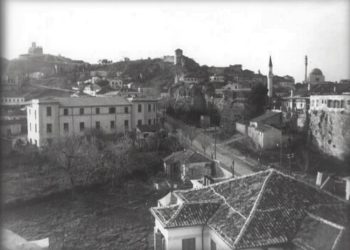Memorie.al / “My eyes were fixed on that boy,” the literature teacher, Zhaneta Tuxhari, begins to tell us the thread of her conversation, the story of meeting her husband, the well-known Korça footballer, the famous center-forward, Maksim Tuxhari. “It felt as if my body caught fire and I was burning completely,” Zhaneta continues. “I had never seen Maks (that’s what I’ve called him since that day) so close before. I was in Voskopojë when I found myself so close to him. At that time, I was in my third year of high school. It was August 1961. The Youth Committee had sent me to the Pioneers’ Camp as a leader for the girls’ company. Maksim Tuxhari had been appointed by the ‘Skënderbeu’ team as the leader for the boys’ company.
From the first moment I laid eyes on him, I almost had a heart attack. He was tall, handsome, and very cheerful. Whenever he laughed (and I liked this very much), I noticed his white and regular teeth, which I don’t know why they graced his face so much. He was very sincere and communicative. I was enjoying his company. Something was urging us to stay as close as possible to each other. We went to the ‘Commander’s Square’ together, to the ‘Soldier’s Fountain’ together, together in the morning and in the evening. A month earlier, on July 2 of that year, in the match between the ‘Budapest Girls’ team and ‘Skënderbeu’ which ended 3-1, the only goal scored by the Korça team was Maks’s. For days on end, that goal was talked about. Maks was with the boys’ company and I was with the girls’, but we held the activities together.
They were very beautiful days that I will never forget. When the holidays were over (how fast those days went!), we returned to Korça. I told my sister, Loreta, and my friends, Ditka and Vilma, what had happened to me with Maks,” remembers Zhaneta, her first meeting with her future husband.
The Secret
“Until that day, we hadn’t said anything to each other (who dared at that time!), but I was sure that he had fallen in love with me and I with him. I had a feeling that made me believe that from the moment we met, we would never be separated again. I wanted to tell my mother about this, but where would I find the courage?
My mother, Krisanthi, was a woman of average height, with a graceful appearance and radiating kindness, but she had her rules and tried to respect them with fanaticism. She loved me very much. When I got sick and the doctor advised me to be admitted to the hospital, my mother sold a part of her dowry because the medicines at that time were very expensive.
However, I couldn’t tell her my secret, which I couldn’t keep inside. My father, Thanasi, died when I was only 13 months old, while my sister, Loreta, was 6 years old. My mother became a widow. After this, we returned to my grandfather Nikollaq’s house. My mother married Mr. Petraq Ballço when I was in the fourth grade. Ballço was a very good man; he treated us as if we were his own daughters. In 1957, our brother, Tomi, was born, whom we love dearly. I don’t know if I would have been able to tell my father this secret. I had always heard that he was a tall and very handsome man; he was a man of song and dance. How much I would have liked him to be at my wedding!
Surely that day he would have sung his most beautiful songs. I found a solution. From my father, we had a radio holder left, the bottom part of which was used for placing books; we also had a notebook in which my father wrote down the entries and exits of goods from a small shop we had at the Korça Bazaar and some other items. I started confessing my love story to the relics left by my father, while my eyes were moistened with tears. At one moment, I don’t know why, I felt fear. It felt as if my father would ask me: ‘Now tell me, my girl, who is this boy you have fallen in love with?'”
“My Mother’s Order”
“To tell you the truth,” Zhaneta continues, “at that time, I didn’t know anything about Maks Tuxhari. In fact, I didn’t want to know anything more; what I felt for him was enough. However, I knew he was a skilled footballer and that he worked as an agronomist in the city’s cooperative. That’s all.
After returning from Voskopojë, I’m not sure if it was me who was looking for Maks or if it was Maks who was looking for me! We met almost by chance. The evening was falling, and we couldn’t part. Maks was as happy as I was. From that day on, we would meet when he finished training. We always met secretly.
I tried not to let my mother find out about my relationship. I always respected her order: ‘You must return home before the streetlights are turned on!’ I had a harder time in the fall and winter, as those damn lights would turn on before 5 p.m. Even though I respected all of my mother’s orders, the news still reached her ears. The peace in our house was broken. My mother didn’t want me to get involved with Maks Tuxhari because he hadn’t finished higher education and, above all, he belonged to the Muslim faith. After that, every evening a reckoning would begin. I would tell her everything in detail, how I did at school, where I had spent the afternoon, and everything else, but my mother would suddenly shift the conversation to Maks.
‘Have you met him?’ she would ask me. ‘No,’ I would answer with fear. But my mother would raise her voice again: ‘You will not meet with Maks again.’ She was not convinced that I had given up on my relationship, and this worried her. At that time, I would learn something else about Maks: he came from a wealthy family, so in 1948, they had been evicted from their home and housed in a barn for livestock. In 1957, they had been returned to their home, but the biographical stain of ‘bourgeois’ would not be removed, in fact, they would be considered as such until the ’90s. I felt sad when I found out about this, but I don’t know why I felt even more love for Maks.”
The Streetlights
“The broken peace in our house continued to be the same as before. My mother kept asking me: ‘Have you met Maks?’ ‘No,’ I would answer. But this dialogue would become even tenser later. The streetlights had been turned on, and I still hadn’t returned home. My mother’s order had been broken.
When my mother noticed that the lights were on, she threw a brown ‘lustre’ jacket over her shoulders and took to the road, thinking that I would be at my friend Ditka’s house, but on the way, she found out that I had been seen at the ‘New Fountains’ with Maks Tuxhari. This information made my mother furious, more out of anger than haste. Without saying another word, she grabbed me by the braid and turned my head, so the white ribbon fell to the ground. Then she said to me: ‘Is this how you carry out the order I gave you?’ She was referring not only to the streetlights that were on but also to the order she had given me not to meet with Maks Tuxhari again. A moment later, my mother turned to Maks: ‘And you aren’t you that Muslim sportsman?’
‘No,’ Maks replied, thinking that with this answer he would help me, but my mother didn’t believe for a second that he wasn’t Maks. She took me with her, very upset and scolding me. From that evening on, my mother limited my afternoon outings, even with friends. We had to find another solution.
We started exchanging letters with each other. The role of the postman was played by Maks’s cousin’s son, Saryhani. We wrote to each other everything that had happened during the days we hadn’t met. Evening outings became very rare for me. I would only go out sometimes when my mother allowed me to sleep over at my close friend Vilma’s house, which lived with two elderly people who had adopted her. This moment was long-awaited for me. I would find a way to let Maks know, and we would meet in the alley of my friend’s house. We would sit on the stone sofa of the gate and at that very moment, when I was next to him, it seemed to me as if the song; ‘You’ve come out and are sitting on the sofa of the gate’ had been created specifically for the two of us.”
Maks
“Maks Tuxhari had started to make a big name for himself. Since he was a child, he had been passionate about football. When he was 8-9 years old, he was part of the neighborhood football club, which they had named ‘Sword.’ They played where today the ‘Vangjush Mio’ park is. This club also included; Sherif Merdani, Hektor Bregasi, Bujar Shkullaku, Gaqo Kane, Neim Tuxhari (Maks’s brother), etc. Neim Tuxhari and Maks Tuxhari would both play for the ‘Skënderbeu’ team. Maks had started training at the Pioneer’s House, with coach Xhuvi Mborja, since 1954, and two years later, he would become part of the ‘Skënderbeu’ youth team and later with the team’s seniors. In 1958, the youth team was declared national champion.
When he was 18, in the fall of 1958, Maks moved up to the senior team. At the time I had fallen in love with him, I started hearing more and more that Maks Tuxhari was one of the best players. They talked a lot about his battles with opponents, the goals he scored with his head, etc. Due to his speed and elegance in the game, the sports fans of Korça started calling him; ‘The Football Dancer of Korça.’ All of this thrilled me.
The game commentators, like Anton Mazreku and Ismet Bellova, considered him a ‘dangerous striker’ and ‘master of headers,’ but nothing that was said about my Maks impressed my mother. For her, he didn’t have a higher education and belonged to the Muslim faith. Besides this, my mother found out again that Maks and I were meeting in the alley of my friend Vilma’s house. The turmoil in our house had erupted again.”
The Engagement
“What was happening between me and Maks, my mother finally told my grandfather. With a frozen heart, I waited to hear what my grandfather would say, but when he found out that Maks came from the Tuxhari and Merdani families, he not only didn’t reject my love, but on the contrary, he was pleased because I had chosen a boy who came from the biggest families in Korça. It was decided that I would get engaged.
I was in my last year of high school, and in October, we announced the engagement, and on November 28, according to custom, we held the ceremony called ‘shkelkat.’ Many people came from Maks’s side; both rooms were filled. I don’t know why I was very shy and confused. I was wearing a sky-blue dress specially sewn for me and pair of flat red shoes, a gift from my sister Loreta and her fiancé, Ilo, and short white socks, as they wore in those years. (My sister finished her studies in Tirana for Teaching).
The wedding day was set for July 25 of the next year. Finally, the dream day had arrived. It was a hot day. We set up the dinner (at my house) in the courtyard. It was a dinner with a close family circle. The next day, I dressed as a bride, in a very beautiful dress that they brought from Maks’s side. I remember the moment I entered the courtyard of the house. I entered shyly but touched, when I saw Maks’s relatives and all the guests who looked at me with kindness.
I will never forget the moment when Maks’s father came out and kissed me on the forehead with love. The wedding dinner at Maks’s house was also held in the courtyard. We felt very happy, surrounded by loved ones. Maks was continuing to make a bigger name for himself as a footballer. In the 1964-’65 championship, he was ranked second as a top scorer with 19 goals, after Robert Jashari of ‘Partizani.’ However, from 1963 until 1971, he would remain the distinguished top scorer for ‘Skënderbeu.'”
At Maks’s House
“Maks’s house was located on the left side of the river that runs through the city near the Executive Committee at that time, today the Korça municipality. From the sidewalk, you would go down a few steps to enter through the large wooden double door. As soon as you entered, your eyes would fall on the large L-shaped courtyard, paved with stone slabs cut into a rectangular shape. On the left was the garden surrounded by iron railings and with a small door with two beautifully crafted panels. The courtyard was decorated with many ceramic flower vases, which were renewed and added to by Maksim’s younger brother, Abidin, who was very passionate about them. The father, Aliqemali, took care of some grapevines and the quince tree that produced quinces nonstop and were as sweet as apples, as well as the cherry tree. To enter the building, you would pass through the glassed-in porch, where flowers were kept in the winter, while to go to the hallway, there was a beautifully crafted, strong wooden door, with light gray centers and dark gray sides. On the right was the family living room of Maks, or as they called it; ‘soba,’ with three windows that faced the courtyard, equipped with wooden shutters crafted like the doors, with great skill. Through a door, you would go down a few wooden steps to a part of the house that the mother used as a cooking kitchen. This part of the house was called the small gate part because through a door, you would exit directly onto the street behind the house, where our neighbors lived.”
My Mother
“My mother and my people felt happy when they came to visit. Whenever the conversation turned to my relationship with Maks, my mother would say: ‘I wouldn’t trade Maks for 100 Orthodox men.’ The two mothers-in-law, my mother and Maks’s mother, got along very well. Both were of average height and close to each other. Maks’s mother would light a cigarette, and when they were drinking coffee, she would offer one to my mother, who enjoyed it every time she came to visit. In 1966, our first daughter, Mirela, was born. She studied at the ‘Vojo Kushi’ Higher Institute of Physical Culture in Tirana. Since 1997, she has been living with her family in the USA in Dallas, Texas. In 1969, Vjola, our second daughter, was born. Vjola also studied at the ILKF; she currently works as a physical culture teacher. However, at that time, the Party people did not forget to remind the girls that they were the daughters of the Korça bourgeoisie. Maksim Tuxhari retired from football in 1971, but during the years 1972-’78, he worked as a coach with the ‘Skënderbeu’ youth team, together with coach K. Koça and later with T. Vaso. Within six years, they managed to win 4 second places and 2 third places. From 1978 until 1981, he worked as an assistant coach for the ‘Skënderbeu’ first team, where the head coach was Todo Vaso. When I remember all this, I say with conviction that in Maks’s house, I felt like a true queen,” the literature teacher, Zhaneta Tuxhari, concludes her narrative with nostalgia. Memorie.al




